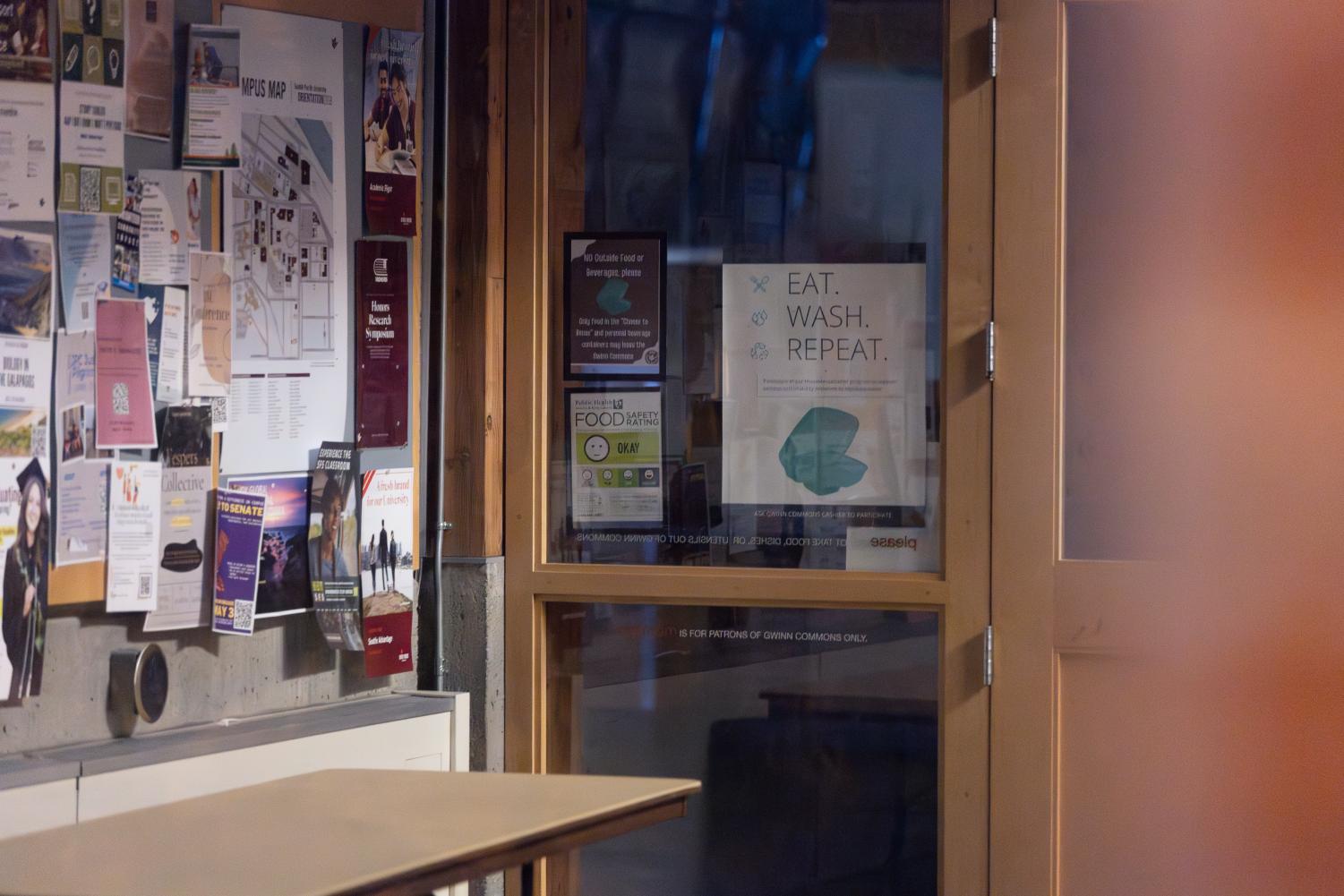Gwinn safety is ‘okay’ according to King County inspection
Dining staff working to return to a higher rating
May 3, 2023

Gwinn Commons dining hall, the primary source of meals for many Seattle Pacific University students, was inspected by Public Health – Seattle and King County on April 11. While the dining hall has received higher scores in previous years, this particular inspection resulted in an unsatisfactory rating, marking the fourth time in a row that Gwinn Commons failed its health inspection.
The food safety rating system is ranked on a scale of four different scores based on the number of safety violations the restaurant has. The possible ratings for a restaurant to receive from lowest to highest are “needs to improve,” “okay,” “good,” and “excellent.” For this particular safety rating, Gwinn Commons dining hall received an “okay”, the second worst rating.
Andrew Chaplin is the general manager for Sodexo at Seattle Pacific University. His job has him overseeing the dining hall staff and system. Chaplin reflects on what might have led to Gwinn’s failed unsatisfactory inspection.
A restaurant receives an “okay” rating if “the restaurant has had many red critical violations over the last four inspections,” according to King County Public Health. The Public Health – Seattle & King County website lists some of the violations/failures found during the April 11 inspection; “no room temperature storage; proper use of time as a control,” proper hot holding temperatures,” “food-contact surfaces maintained, clean, sanitized.”
“We had two issues that were [from] human error that did not affect food safety, which led to some deductions,” Chaplin explained. “Then we also had some equipment issues … the equipment is 20 years old, and it gets a lot of use, and we’re working through that to try and get a lot of that fixed and worked out”
For many students of SPU, especially those living on campus with a meal plan, the dining hall is their primary way of getting fed. With a low food safety score, guests may grow concerned over whether or not their food is safe to eat.
Eliza Matelich is a third-year English literature major. She sometimes has concerns over food safety at the dining hall but continues to eat at Gwinn on a daily basis, mostly because she does not have many other options for full meals.
“I would say I have felt uneasy only once or twice after eating at Gwinn. I am not surprised to hear that as many of my friends have gotten food poisoning from Gwinn,” Matelich said. “[The rating] doesn’t impact my enjoyment of Gwinn too much, because I don’t care enough to try and eat somewhere else.”
Madison Stephens is a third-year art major and eats at Gwinn Commons only a few times a week. While she admits feeling shocked about the food safety rating, she is willing to give the dining hall staff the benefit of the doubt, despite the overall changes she would like to see with the dining hall, from improving the food quality to food safety.
“I didn’t really know we were at that [rating]. “I want to believe that the staff [has] our best interests in mind,” Stephens said. “They’re all nice, but I do think it’s difficult to produce healthier options. Of course, I wish our food was better, but coming from another university where the food was so much worse, I’m overall satisfied.”
When it comes to students feeling uncomfortable with the low food safety rating, Chaplin ensures that the dining staff works to create a safe dining environment, despite the most recent food safety score not living up to standards.
“It would make people a little concerned, I would think,” Chaplin said regarding the “okay” rating for the dining hall. “But I would say that I don’t believe there’s any reason for concern, because we have ongoing processes in place. We do everything we can in the process to try and maintain proper food safety.”
Keegan Haag is a first-year general psychology major and works at the Gwinn Commons dining hall. As an employee, he believes a struggle the staff faces is the aging equipment that may result in point deductions during health inspections.
“By and large, it’s just not state-of-the-art equipment,” Haag said. “But nobody’s getting served anything that isn’t safe or anything.”
This equipment is an issue SPU dining especially struggles with, according to Chaplin. In the case of the latest health inspection, faulty equipment may have been the major factor in the dining hall’s low score.
“With the equipment, you’re struggling, you know. Some equipment is on its last legs, and it’s not necessarily working. But the equipment in question was working the day before [the inspection], and didn’t work that day,” Chaplin explained.
Chaplin is sure his team will manage to return the dining hall’s food safety rating back to its former score of “good” to “excellent.” The staff has continued safety training refreshers and additional team gatherings.
“There’s a training process [for new employees], and then there’s ongoing training as they go. We have monthly trainings. We have daily huddles where we talk about safety and training. So I would say it’s ongoing on a regular basis,” Chaplin said.
While health inspections typically take place twice a year, a follow-up inspection for Gwinn Commons occurred on April 25. While the results on the Public Health – Seattle & King County website describe the follow-up inspection as “satisfactory,” the specific rating of either “okay” or “excellent” is not clear. Seattle and King County health inspections happened unannounced, so restaurants do not have prior knowledge of when an upcoming inspection will happen.



























































































rick larson • Mar 30, 2024 at 6:44 pm
So have they improved? I hear kids are still getting sick?